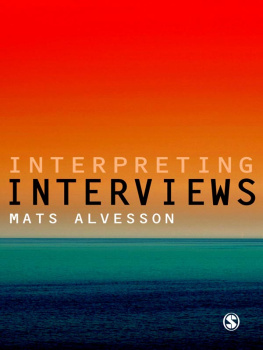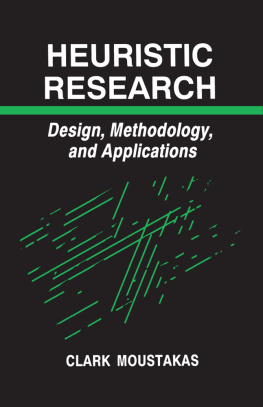Reflexive Methodology
New Vistas for Qualitative Research
Reflexive Methodology
New Vistas for Qualitative Research
3rd Edition
- Mats Alvesson
- Kaj Skldberg
SAGE Publications Ltd
1 Olivers Yard
55 City Road
London EC1Y 1SP
SAGE Publications Inc.
2455 Teller Road
Thousand Oaks, California 91320
SAGE Publications India Pvt Ltd
B 1/I 1 Mohan Cooperative Industrial Area
Mathura Road
New Delhi 110 044
SAGE Publications Asia-Pacific Pte Ltd
3 Church Street
#10-04 Samsung Hub
Singapore 049483
Mats Alvesson and Kaj Skldberg 2018
First edition published 2000. Reprinted 2004, 2005, 2007, 2008
Second edition published 2009. Reprinted 2010, 2012, 2013, 2014, 2015, 2016 (twice)
This edition first published 2018
Apart from any fair dealing for the purposes of research or private study, or criticism or review, as permitted under the Copyright, Designs and Patents Act, 1988, this publication may be reproduced, stored or transmitted in any form, or by any means, only with the prior permission in writing of the publishers, or in the case of reprographic reproduction, in accordance with the terms of licences issued by the Copyright Licensing Agency. Enquiries concerning reproduction outside those terms should be sent to the publishers.
Library of Congress Control Number: 2017937335
British Library Cataloguing in Publication data
A catalogue record for this book is available from the British Library
ISBN 978-1-4739-6423-5
ISBN 978-1-4739-6424-2 (pbk)
Editor: Kirtsy Smy
Editorial assistant: Lyndsay Aitken
Production editor: Katherine Haw
Copyeditor: Neville Hankins
Proofreader: David Hemsley
Indexer: Martin Hargreaves
Marketing manager: Susheel Gokarakonda
Cover design: Shaun Mercier
Typeset by C&M Digitals (P) Ltd, Chennai, India
Printed in the UK
Praise for Previous Editions
Reflexive Methodology is a textbook indispensable to any young researcher. It does not tell its readers how to do research. It does something much more important: It shows how research has been done in the qualitative tradition, thus encouraging the readers to make their own choices.
Barbara Czarniawska, Goteborg University, Sweden
I would go so far as to argue that this book should be on the reading list of all social scientists and philosophers with an interest in the theory and practice of research.
Prometheus
The quality coverage of theoretical and methodological approaches in previous chapters will give most researchers the tools to be able to attempt a reflexive interpretive process... There is a sense of richness, depth and argumentation that should satisfy most readers. Admirably, the narrative drive of the volume is never lost under the collective weight of the different approaches covered. The authors argument that qualitative researchers should be open to recognising and utilising a multiplicity of approaches is compelling, and in their framework for reflexive interpretation, they offer a persuasive and largely usable tool for doing so.
Qualitative Methods in Psychology
About the Authors
Mats Alvessonis Professor in Business Administration at the University of Lund, Sweden, at University of Queensland Business School, Australia, and at Cass Business School, London. Research interests include critical theory, gender, power, management of professional service (knowledge-intensive) organizations, leadership, identity, organizational image, organizational culture and symbolism, qualitative methods and philosophy of science. Recent books include
Reflexive Leadership (Sage 2017, with Martin Blom and Stefan Sveningsson),
The Stupidity Paradox (Profile 2016, with Andr Spicer),
Managerial Lives (Cambridge University Press 2016, with Stefan Sveningsson),
The Triumph of Emptiness (Oxford University Press 2013),
Qualitative Research and Theory Development (Sage 2011, with Dan Krreman),
Constructing Research Questions (Sage 2013, with J. Sandberg),
Interpreting Interviews (Sage 2011),
Metaphors We Lead By: Understanding Leadership in the Real World (Routledge 2011, edited with Andre Spicer) and
Changing Organizational Culture (Routledge 2015, 2nd edition, with Stefan Sveningsson).Kaj Skldbergis Professor Emeritus in Business Administration at the School of Business, University of Stockholm, Sweden. Research interests include the philosophy of science, social power, social identities, organization science, management science, complexity science and the poetics of organizations. Published books in the 2000s include
The Poetic Logic of Administration: Styles and Changes of Style in the Art of Organizing (Routledge 2002),
Tracks and Frames: The Economy of Symbolic Forms in Organizations (Elsevier 2002) and
Maktens mnga ansikten [The many faces of power] (Studentlitteratur 2014).
Foreword
In this third, revised and updated edition of Reflexive Methodology we have expanded the final, applied chapters from two to three. The additional text provided here about reflexive problematization and in particular the idea of finding mysteries offers, we believe, alternatives to traditional gap-spotting in research. New also is a section in the meta-scientific on DeLandas provocative, and topical, neorealist assemblage theory. Beyond these additions, we have updated the text with recent books and articles in the different areas treated, and intervened in many places at the micro level with clarifications and explanations.
Introduction: The Intellectualization of Method
Traditionally research has been conceived as the creation of true, objective knowledge, following a scientific method. From what appears or is presented as data, facts, the unequivocal imprints of reality, it is possible to acquire a reasonably adequate basis for empirically grounded conclusions and, as a next step, for generalizations and theory-building. So the matter has long been conceived, and no doubt many empirically oriented researchers in the social sciences still conceive it so, irrespective of whether they are examining objective reality (social facts), exploring peoples subjective or intersubjective experiential worlds (meanings), or analysing discourse (text).
This view has been subjected to a good deal of criticism, however, much of which appeared towards the end of the 1960s and was directed against positivism. But there has since been further criticism applying also to diverse variants of the qualitative method, sometimes automatically seen as anti- or at least as non-positivist. For the moment we will mention only such critique that emphasizes the ambiguous, unstable and context-dependent character of language, the dependence of both observations and data on interpretation and theory (interpretation-free, theory-neutral facts do not, in principle, exist), and the politicalideological character of the social sciences. One line of argument here starts from the notion that knowledge cannot be separated from the knower (Steedman, 1991: 53). Data and facts, as we will demonstrate, are the constructions or results of interpretation: we have to do something with our sensory impressions if these are to be comprehensible and meaningful. Alongside this general critique of the objectivist scientific view and the heavy focus on empirical data, more specific criticism is raised about various methodological conceptions and methods. The methodological conceptions and methods of the social sciences have been exposed to such a barrage of objections that one might have expected empiricists to lose their self-confidence and consider turning to some other branch of study instead.1 But in fact the big risk seems to be that practising researchers stick in the same old rut, either repressing the criticism altogether or remaining more or less unaware of it. Many of the critics, on the other hand, tend to go to the opposite extreme and cut out empirical reality altogether although exactly how they do this depends on their particular scientific orientation. Not infrequently they study something that carefully avoids statements about anything other than narrative or discourse or social constructions in interviews, thereby ducking many if not most important and interesting aspects of social reality.









